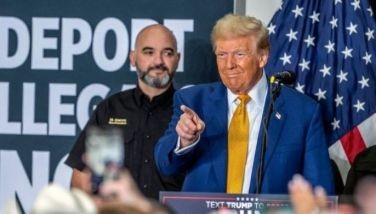UK's anti-EU victors will find it hard to fulfill promises
LONDON - Politicians who wanted Britain to leave the European Union were not shy about making promises. They plastered their campaign bus with vows to "take back control" on immigration and boost funding for the beloved National Health Service.
But with Britain facing months or years of negotiations to detach itself from the 28-nation bloc, victorious "leave" leaders will find their pledges of prosperity, sovereignty and more public spending hard to keep.
They know it, and are already lowering expectations.
Conservative "leave" supporter Iain Duncan Smith now says the campaign had not laid out promises but simply "a series of possibilities." And having shocked the world — and global markets — with the referendum result, Britain appears in no hurry to rush out the EU's exit door.
The "leave" campaign led by former London Mayor Boris Johnson has yet to lay out what it thinks Britain's future relationship with the EU should look like, and Prime Minister David Cameron says Britain won't trigger formal divorce talks until a new prime minister is in place after the summer.
Before Thursday's referendum, however, the "leave" side's tone was considerably less ambiguous: They wanted out, they wanted control of EU immigration and they wanted a lot of money back from the EU.
"Let's take back control," said a slogan on the "Vote Leave" bus that traversed the country, as its leaders argued that Britain could secure its borders and limit EU immigration only by exiting the bloc, therefore eliminating the right that EU workers have to live and work in Britain.
An estimated 2 million Poles have come to work in Britain since 2004, and 850,000 are still here.
Another bus-side "leave" pledge said: "We send the EU 350 million pounds a week — let's fund our NHS instead."
Many economists think there's a conflict between the key promises of reducing EU immigration and producing a flourishing economy. They argue that Britain needs access to the EU's tariff-free single market of 500 million people, and won't get it if it tries to restrict the free movement of EU labor.
Jonathan Portes, principal research fellow at the National Institute of Economic and Social Research, said anti-EU campaigners chose to ignore the link between economic access and EU immigration in order to win votes.
"They told lots of people that these trade-offs, which were reasonably obvious and are now coming to the fore, didn't exist," Portes said. "Sooner or later they will have to deal with it."
The desire to curb immigration motivated many "leave" voters, since more than 3 million people born in other EU nations now reside in Britain. An estimated 1.2 million Britons, including many retirees, have moved to other EU nations, but Britain's relatively thriving economy has meant that immigration has far outstripped emigration in recent years.
Many Britons who voted "leave" believe those EU immigrants have placed strains on schools, hospitals and housing, even though they have paid taxes and many economists argue that immigrants are an economic boon.
Leaving the EU would allow Britain to "take back control" by renouncing the free-movement principle. But if it did, it would be unlikely to get open access to the EU's single market, with which the U.K. currently conducts half its trade, exporting everything from beef and lamb to financial services.
Portes said a deal offering free trade but not free movement would have "fairly significant negative consequences" for the British economy and British living standards.
An alternative could be to let Britain keep its access to the single market in return for paying the EU and accepting the free-movement principle — roughly the deal that Norway has. That would eviscerate "leave" side promises to curb immigration, however.
Still, Johnson, one of the top prospects to become Britain's next leader, seems to favor that option. He said in a column for yesterday's Daily Telegraph newspaper that Britain would forge "a new and better relationship with the EU — based on free trade and partnership."
Some senior "leave" campaigners acknowledge that under that model, immigration would not necessarily fall.
Daniel Hannan, a euroskeptic Conservative member of the European Parliament, told the BBC he favored "the idea of staying within a common market but outside the political integration" of the EU.
"(That) means free movement of labor," he admitted.
A British exit could also complicate a key piece of Britain's border controls. France currently lets British officials conduct border checks on its soil, so non-European migrants hoping to reach Britain get only as far as Calais, on the French side of the English Channel. The mayor of Calais has threatened to change that arrangement, saying "the British must take the consequences of their choice."
Another whopping "leave" promise was that the move would shift 350 million pounds ($462 million) a week away from the EU and into British health care. The figure — labeled grossly misleading by "remain" campaigners — is roughly Britain's gross contribution to EU coffers. But the U.K. gets half the money back through a rebate and other discounts, and also receives billions a year from the EU, for everything from farming to science and heritage projects.
It's not clear how much Britain would save under any future deal with the EU. Norway, which is outside the bloc, pays almost as much per capita to the EU as Britain now does.
And even if Britain makes some savings, its hospitals will have to compete with many other areas of the economy for funds. Asked if he could guarantee that 350 million pounds a week would go to health care, U.K. Independence Party leader Nigel Farage said: "No, I can't."
He said the claim "was one of the mistakes, I think, that the 'leave' campaign made."
Even the most fundamental promise of all — that Britain will take itself out of the EU — is not a certainty.
Cameron says he won't fire the starting gun on formal exit talks, leaving that for a new prime minister to be selected after a Conservative leadership battle this summer.
But that leader may want to call an election to seek a mandate for the EU negotiations. If that election produces a pro-EU majority of lawmakers, they could seek to stall, or refuse to implement, the referendum result. Scottish leader Nicola Sturgeon has already said she would try to get Scottish lawmakers to block Britain's departure from the EU.
Many of the 48 percent of Britons who voted to remain in the bloc now feel angry, worried and hurt.
That feeling of betrayal may soon extend to "leave" side voters when they realize the political promises they counted on have not been kept, says David Blunkett, a former Labour government interior minister.
"We've ended up with the likelihood of a far-right Conservative government in the U.K., with the U.K. disintegrating, with resentment about the fact that those who have been in favor of "leave" won't be able to deliver the kind of things they've promised," Blunkett told the BBC. "I fear greatly for democratic politics here."
- Latest
- Trending
































